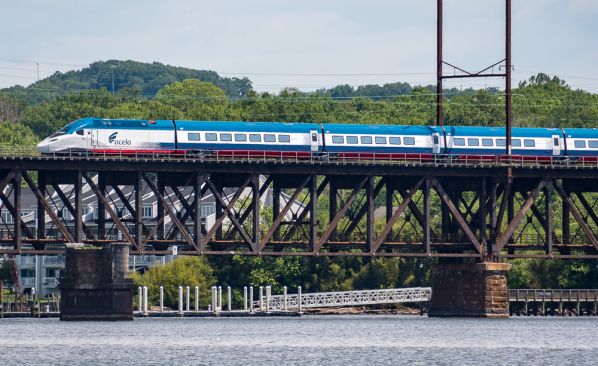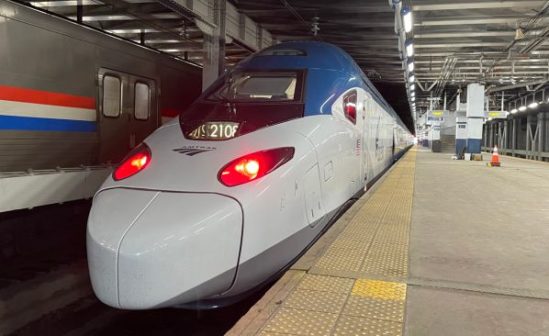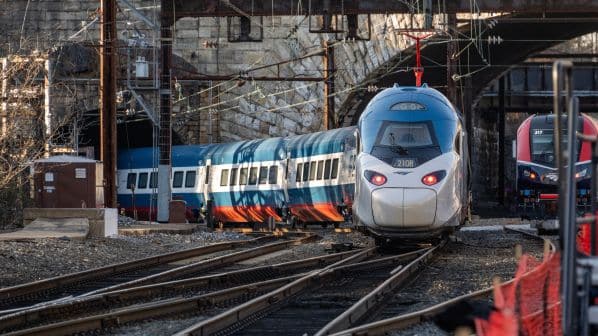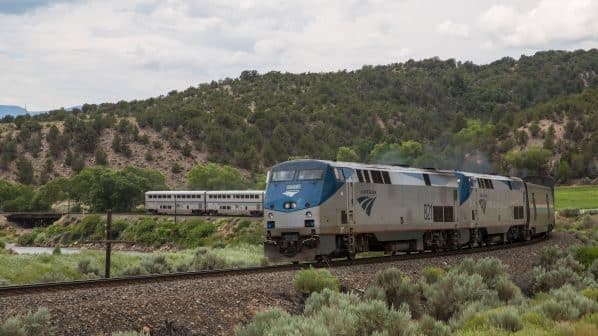AMTRAK is facing further delays with the approval of its new Acela train fleet, delivery of which is already three years behind schedule, due in part to what the latest Amtrak Office of Inspector General (OIG) report has described as defects and designs which do not yet meet Federal Railroad Administration (FRA) requirements.
The delays “have already resulted in significant cost increases, operational impacts and delayed revenue,” OIG said in the report published on September 29.
Amtrak awarded Alstom a contract to develop and manufacture 28 new Avelia Liberty high-speed trains in 2016 under a process that began in 2014. The $US 2.3bn New Acela Programme is intended to replace Amtrak’s aging fleet of high‐speed trains on the Northeast Corridor (NEC) and the new fleet was scheduled to begin revenue service in May 2021.
As of July 2023, OIG said 12 of the 28 serial production trains and 22 of the 28 café cars had been manufactured, but Amtrak had not accepted any trains as of August 2023. Alstom confirmed to IRJ that it is continuing to produce the high-speed trains at its plant in Hornell, New York, and has delivered nine of the 28 trains. It is also “storing a number offsite to ensure continuity of production.”
OIG also reported that Amtrak had spent approximately $US 1.6bn on the entire programme by July; the figure covering the fleet acquisition alone was redacted in the report. OIG notes that Amtrak’s most recent plan is to launch revenue service in 2024 with the first six functional trains that have been delivered.
OIG says it has identified two reasons for the current - and “likely future” - delays:
Train designs have not yet met FRA requirements.
Federal regulations require Amtrak “to submit to FRA train performance predictions from a computer model showing that the model is valid and the trains are safe to proceed with required testing,” according to OIG.
“Although the company must submit these predictions to FRA for approval, the vendor is responsible for developing and validating the model,” the report says.
“Contrary to leading practices, however, the vendor started producing serial trains before it validated the model.” OIG noted in the report that Alstom has produced 14 full trains: 12 serial trains and two prototypes that are not considered serial trains.
“Now, three years after starting serial production, the vendor has built more than half of all units, but has not yet validated the model, which is the first step in a multi-step regulatory testing process,” the report continues.
OIG reports that Amtrak officials have stated that they did not object to the vendor proceeding into production because, among other things, they were overly optimistic about the vendor’s progress and believed the vendor’s assurances that validation was close.
“Without a validated model, FRA will not let the company move forward with the rest of its required testing,” the report says. “Until the company completes testing, the train cannot operate in revenue service let alone at the advertised speed of 257km/h.”
Alstom says it is collaborating closely with the FRA and Amtrak “as we work through their first-ever safety certification for high-speed trains” to ensure that the new Acela trains meet all FRA requirements for entry into service.
“As part of the validation, in addition to ongoing modelling activities, we have already successfully run these trains on the FRA’s Pueblo, Colorado, test track at high speed and on the Northeast Corridor for a total of nearly 112,600km,” Alstom says.
“We share Amtrak’s excitement in bringing this technology to America.”
Trains have defects, and the schedule for addressing them is “incomplete.”
According to OIG, all 12 serial trains and 22 café cars produced have defects including “some that require structural and design modifications and others that require sealant, drainage, or corrosion corrections.” Although some defects are expected when producing a new train, OIG says that Alstom’s schedule for addressing them is incomplete and Amtrak “has not been successful in obtaining more complete scheduling data.”
“Without more complete information, the company cannot verify whether remediating the defects will impact the overall program schedule and the revenue service launch,” the report says.
Alstom says it is “surprised with the so-called defects that the OIG identifies” and says that modifications identified during inspections, along with additional changes requested by Amtrak, are “in no way in the critical path of completion of this project.”
“Every train that has been released from the manufacturing site was authorised for shipping by Amtrak after thorough inspections, with identified modifications to be completed prior to acceptance,” Alstom said in a statement released to IRJ. “These modifications will be completed before final acceptance of the trains, as it is foreseen in the contract and is customary in our industry.”
The OIG report adds that the issues identified are similar to those that have occurred during procurement of other new Amtrak rolling stock. Amtrak is planning a multi-billion-dollar programme to replace its fleet of long-distance trains, and expects to start the formal tendering process to replace the 800-strong long-distance coach fleet by the end of this year or in early 2024. It is also engaged in the ongoing process of replacing its inter-city trains, exercising an option from the contract with Siemens to supply an additional 10 Airo push-pull sets in August, taking the total order to 83 trains.
The OIG recommends the following three actions to Amtrak:
- Enhance the company’s formal processes, tools and techniques to ensure that it regularly captures lessons learned from this and other rolling stock purchases and incorporates them into ongoing and future rolling stock procurement.
- Direct the vendor to provide complete schedules to address field modification instructions. At a minimum, this would include the location of work, viable engineering solutions, and the availability of materials and personnel.
- Work collaboratively with the vendor to identify the risk of future field modification instructions, as well as any modifications needed as a result of the model validation process, and develop plans to mitigate their schedule impact.
In commenting on a draft of its report, OIG says that Amtrak’s executive vice-president, capital delivery, Ms Laura Mason, “agreed with our recommendations and described the company’s plans to address them.”
OIG has published the following summarised responses from Amtrak:
- Recommendation 1: Management agreed with our recommendation to enhance its formal processes, tools and techniques to ensure that it regularly captures lessons learned from this and other rolling stock acquisitions. Management outlined its ongoing and planned enhancements to its Enterprise Project and Portfolio Management system - the company‐wide unified project management system that includes a lessons learned module. The target completion date is February 29 2024.
- Recommendation 2: Management agreed with our recommendation to direct the vendor to provide more complete schedule information to address field modification instructions. Management stated that it will request the vendor to expand the current spreadsheet and include information on the location of planned work and the availability of material and personnel. The target completion date is November 30 2023.
- Recommendation 3: Management agreed with our recommendation to work collaboratively with the vendor to identify the risk of future field modification instructions to mitigate the schedule impact. Management stated it will build on its ongoing efforts with the vendor in modelling, testing, and quality. It also stated it plans to expand these efforts to include increased joint working sessions and weekly touch-point meetings, a monthly review of risk areas, and the development of risk mitigations steps to try and reduce the impact to the overall schedule. The target completion date is May 31 2024.
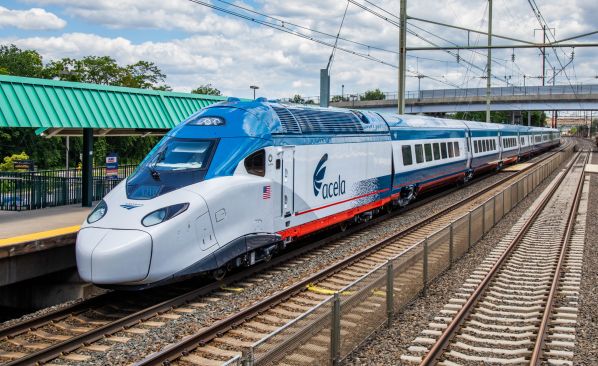
In May, The Washington Post reported that the Avelia Liberty trains were experiencing “complications in completing testing… along the NEC’s ‘decrepit infrastructure’.”
According to the newspaper, the new trains “need more analysis to ensure they can safely operate on the curvy and aging tracks between Washington and Boston.” Numerous delays have been attributed to “unforeseen complexities in testing and computer simulation processes required by the FRA. Amtrak and … Alstom have cited some compatibility hiccups between the high-tech train, modelled after those in operation across Europe, and infrastructure that dates back 190 years in some areas. The latest hurdle, officials said, involves testing the train’s wheels, particularly at higher speeds.”
“Modelling of the wheel-to-track interface is particularly complex due to age, condition, and specific characteristics of Amtrak infrastructure on the NEC, and especially the existing tracks,” Alstom told The Washington Post, adding that it has been “conducting extensive investigations” to ensure safe operation and is “confident that this extensive process will demonstrate compatibility of the latest generation of high-speed technology with existing infrastructure.”
“Further refinement of analysis, simulations and testing” are required, Amtrak told the newspaper. “We want our customers to experience these new trains as soon as possible, but Amtrak cannot operate them for passenger service until Alstom has completed testing and meets all safety requirements.”
The full OIG report is available to read here.
For detailed data on fleet orders from around the world, subscribe to IRJ Pro.
